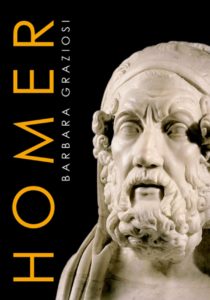Lecture Date: February 10, 2022
The Virginia Partners Bank Lecture

Mark Twain had a school-boy declare: ‘Homer was not written by Homer, but by another man of that name’ – which suggests that the myth of the author endures, despite scholarly attempts to debunk it. The earliest sources that mention Homer by name date to the sixth century BCE: from them we can establish that the Greeks considered Homer the greatest poet that ever lived, but also that they knew nothing certain about him. The situation has not changed much: to this day, Homer is often hailed as the greatest poet of all time – even though it is not even clear he existed. This lecture considers two types of evidence in order to try and establish when, how, and by whom the Homeric poems were composed: textual hints contained within the Iliad and Odyssey and material clues revealed by the archaeology of the early Mediterranean. It also pays attention to what the Greeks had to say about Homer, not because their accounts necessarily reveal who composed the Iliad and the Odyssey, but because they illuminate how the poems were understood by their early audiences and how they continued to appeal to listeners and readers from antiquity to today.
Speaker: Barbara Graziosi

Barbara Graziosi was educated in Oxford and Cambridge and taught in Oxford, Reading, and Durham before moving to Princeton in 2018. Graziosi held fellowships at New College, Oxford, the Center for Hellenic Studies, Washington DC, and visiting professorships at a number of academic institutions.
Her research focuses on ancient Greek literature and the ways in which audiences and readers make it their own. This overall focus is expressed in a series of publications on ancient Greek literature and its reception, (in her support for innovative work in the digital humanities), as well as in her teaching, public engagement, and broadcasting. A substantial part of Graziosi’s work explores Homeric epic: Her first book, Inventing Homer (Cambridge 2002) argues that early stories about Homer reveal how archaic and classical audiences imagined the poet and understood his poetry. Homer (Oxford 2016) summarizes Graziosi’s current thinking on this author and the works attributed to him.
The connections between ancient literature and its readers from different times and places are also important to her teaching and public engagement. She was awarded an Excellence in Teaching Award by Durham University (UK), as well as a National Teaching Fellowship, the highest recognition of excellence in higher education in the United Kingdom. An Excellence in Doctoral Supervision Award reflects her commitment to graduate teaching and, more importantly, the commitment and excellent research carried out by the students she supervised in the UK. Graziosi has contributed to several programmes for BBC television and radio, as well as for French and Italian television and the US History Channel. Her reviews on both classics and contemporary fiction have appeared in the Times Literary Supplement, the Times Higher Education, and The London Review of Books.